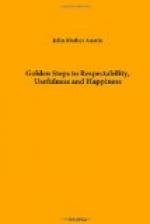I would disabuse the young of the idea that religion is needed only by the aged, the sick, and the dying; and that it can be of no essential service at other times. It does indeed become the hoary head, more than the jewelled diadem. It is the comforter of the sick—the supporter of the departing spirit—giving it a sustaining power which all earth’s riches cannot purchase. But religion is quite as appropriate and essential to the youthful as to the aged and sick. It is equally as important that men should live right, as die right. There is no way so effectually to insure a peaceful and happy death, as to live a good and useful life. Religion leads to such a life, and prepares the way for such a death. Hence the necessity that the young should give themselves up to its influences in the morning of their days, that their meridian may be fruitful of good, and their evening sunset calm and serene.
Away, then, with the supposition, that religion is not adapted, nor necessary to youth. “The flower of youth never appears more beautiful, than when it leans towards the Sun of Righteousness.” Religion is the brightest ornament with which the young can bedeck themselves. The fragrant blossom which crowns the tree, is not more beautiful, or hopeful of coming fruitfulness, than is religion to the freshness of youth. Indeed, as the blossom is necessary to insure the rich and golden fruit, so is early religion requisite to a useful and prosperous career. It is the best preparation the young can secure for after life, whatever calling they may pursue. There is no occupation, no pursuit, no profession, which they will not be far better prepared to enter, by the influence of an enlightened, cheerful, enlarged Christian faith and practice. These will interfere with no useful enterprise, no honest business, no laudable calling; nor prevent the prosecution of any of the many projects among men, which comport with the public good, and are executed on principles of integrity. Religion will make its possessors better and more successful laborers, mechanics, manufacturers, agriculturists, merchants, and more respected and useful members of any of the learned professions.
If there is any pursuit, any business, which you cannot prosecute with the sanction of religion, avoid it at once and forever. You had better do anything else than engage in it. I would have the young strongly impressed with this view. It would be far preferable to suffer poverty and obscurity, in an honest and useful calling, than to obtain the possession and fame of great riches, in a pursuit which the pure and enlightened principles of Christianity would condemn. Although you may succeed in hoarding up mountains of gold in such a pursuit, and in possessing broad domains and “the cattle on a thousand hills,” yet all this will not afford you one throb of genuine enjoyment. There would be that in the manner of obtaining these possessions, which would utterly deprive




